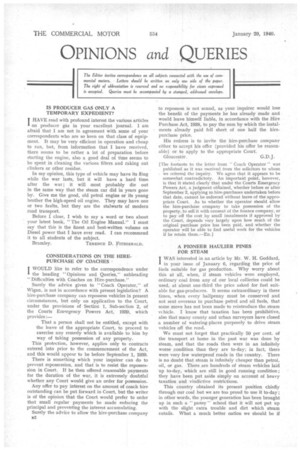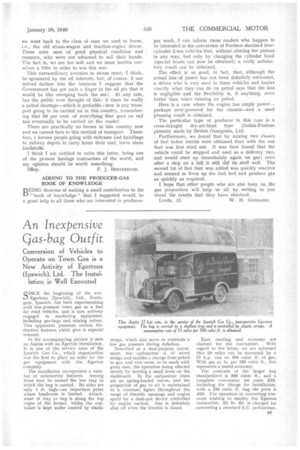OPINIONS and QUERIES
Page 28

Page 29

If you've noticed an error in this article please click here to report it so we can fix it.
The Editor invites correspondence on all subjects connected with the use of corn
ntercial motors. Letters should be written on only one side of the paper. The right of abbreviation is reserved and no responsibility for views expressed is accepted. Queries must be accom panied by a stamped, addressed envelope.
IS PRODUCER GAS ONLY A TEMPORARY EXPEDIENT?
T HAVE read with profound interest the various articles I on producer gas in your excellent journal. I am afraid that I am not in agreement with some of your correspondents who are so keen on that class of equipment. It may be very efficient in operation and cheap to run, but, from information that I have received, there seems to be rather a lot of preparation before starting the engine, also a good deal of time seems to be spent in cleaning the various filters and raking out clinkers or other residue.
In my opinion, this type of vehicle may have its fling while the war lasts, but it will have a hard time. after the war; it will most probably die out in the same way that the steam car did in years gone by. Give me the good, old petrol engine or its young brother the high-speed oil engine. They may have one or two faults, but they are the stalwarts of modern road transport.
Before I close, I wish to say a word or two about your latest book, "The Oil Engine Manual." I must say that this is the finest and best-written volume on Diesel power that I have ever read. I can recommend it to all students of the subject.
Bromley. TERENCE D. FITZGERALD.
CONSIDERATIONS ON. THE HIREPURCHASE OF COACHES I WOULD like to refer to the correspondence under the heading "Opinions and Queries," subheading "Difficulties with Coaches on Hire-purchase."
Surely the advice given to "Coach Operator," of Wigan, is not in accordance with present legislation? A hire-purchase company can repossess vehicles in present circumstances, but only on application to the Court, under the provisions of Section 1, Sub-seetion 2, of the Courts Emergency Powers Act, 1939, which provides:—
That a person shall not be entitled, except with the leave of the appropriate Court, to proceed to exercise any remedy which is available to him by way of taking possession of any property.
This protection, however, applies only to contracts entered into prior to the commencement of the Act, and this would appear to be before September 1, 1939.
There is something which your inquirer can do to prevent repossession, and that is to resist the repossession in Court. If he then offered reasonable payments for the duration of the war, it is extremely doubtful whether any Court would give an order for possession.
Any offer to pay interest on the amount of coach hire outstanding can be put forward in Court, but the writer is of the opinion that the Court would prefer to order that small regular payments be made reducing the principal and preventing the interest accumulating.
Surely the advice to allow the hire-purchase company B2 to repossess is not sound, as your inquirer would lose the benefit of the payments he has already made and would leave himself liable, in accordance with the Hire Purchase Act, 1938, to pay the sum by which the instalments already paid fell short of one half the hirepurchase price.
His redress is to invite the hire-purchase company either to accept his offer (provided his offer be reasonable) or to apply to the appropriate Court.
Gloucester. G.D.J.
[The footnote to the letter from " Coach Operator" was published as it was received from the solicitors to whom we referred the inquiry. We agree that it appears to be somewhat contradictory. An important point, however, is that it stated clearly that under the Courts Emergency Powers Act, a judgment obtained, whether before or after September 2, applying to hire-purchases undertaken before that date, cannot be enforced without leave of the appropriate Court. As to whether the operator sNould allow the hire-purchase company to take possession of the property, to sell it with consent of the finance company, or to pay off the cost by small instalments if approved by the Court, depends very largely upon how much of the original purchase price has been paid, and whether the operator will be able to find useful work for the vehicles if he retain them.—ED.]
A PIONEER HAULIER PINES FOR STEAM
I WAS interested in an article by Mr. W. H. Goddard, I in your issue of January 6, regarding the price of fuels suitable for gas production. Why worry about this at all, when, if steam vehicles were employed, ordinary coal from any of our local collieries could be used, at about one-third the price asked for fuel suitable for gas-producers. It seems extraordinary in these times, when every halfpenny must be conserved and not sent overseas to purchase petrol and oil fuels, that some move has not been made to reintroduce the steam v( hicle. I know that taxation has been prohibitive, also that many county and urban surveyors have closed a number of watering-places purposely to drive steam vehicles off the road.
We must not forget that practically 50 per cent, of the transport at home in the past war was done by steam, and that the roads then were in an infinitely worse condition than they are to-day; in fact, there were very few waterproof roads in the country. There is no doubt that steam is infinitely cheaper than petrol, oil, or gas. There are hundreds of steam vehicles laid up to-day, which are still in good running condition; they have been put aside simply on account of heavy taxation and vindictive restrictions.
This country obtained its present position chiefly through our coal but we are too proud to use it to-day ; in other words, the younger generation has been brought up in such a " pansy " school that it will not put up with the slight extra trouble and dirt which steam entails. What a much better nation we should be if we went back to the class of man we used to know, i.e., the old steam-wagon and traction-engine driver. These were men of good physical condition and resource, who were not ashamed to soil their hands. The fact is, we are too soft and we must harden ourselves a little in order to win this war.
This extraordinary aversion to steam must, I think, be sponsored by the oil interests, but, of course, if one delved farther into the business I suppose that the Government has got such a finger in the oil pie that it would be like sweeping back the sea l At any rate, has the public ever thought of this: if there be really a petrol shortage—which is probable—how is any transport going to be carried on in this country, remembering that 90 per cent. of everything that goes on rail has eventually to be carried on the roads?
There are practically no horses in this country now and we cannot turn to this method of transport. Therefore, I foresee people going with suitcases and handbags to railway depots to carry home their coal, leave alone foodstuffs.
I think I am entitled to write this letter, being one of the pioneer haulage contractors of the world, and my opinion should be worth something.
Iffley. F. J. BRETHERTON.
ADDING TO THE PRODUCER-GAS BOOK OF KNOWLEDGE
BEING desirous of making a small contribution to the "book of knowledge" that I suggested would be a great help to all those who are interested in producer
gas work, I can inform those readers who happen to be interested in the conversion of Fordson standard fourcylinder 2-ton vehicles that, without altering the pistons in any way, but only by changing the cylinder head (special heads can now be obtained) a really satisfactory result can be obtained.
The effect is so good; in fact, that, although the actual loss of power has not been definitely -estimated, a driver who is very used to these vehicles and knows exactly what they can do on petrol says that the loss is negligible and the flexibility is, if anything, even better than when running on petrol.
Here is a case where the engine has ample power— perhaps over-powered for the chassis—and a most pleasing result is obtained.
The particular type of producer in this case is a cross-draught dry-air-blast type (Gohin-Poulenc patents) made by British Gazogenes, Ltd.
Furthermore, we found that by mixing two classes of fuel better results were .obtained than with the one that was first tried out. It was then found that the vehicle could be stopped and used as a delivery van, and would start up immediately again on gas ; even after a stop on a hill it still did its stuff well. The second lot of fuel that was added was quickly reactive and seemed to liven up the fuel bed and produce gas as quickly as required.
I hope that other people who are also busy on the gas proposition will help us all by writing to you about the results that they have obtained.
Leeds, 11. W. H. GODDARD.




























































